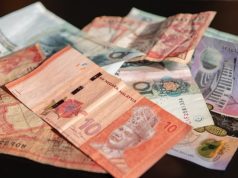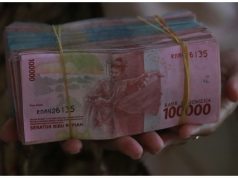
- Indonesian inflation eases in June
- S.Korean won declines 0.4% during longer trading hours
- Investors eye raft of inflation prints due this week
Most Asian stocks rose on Monday as traders assessed the U.S. rates outlook after data showed inflation in the world’s largest economy subsided in May, while currencies were trading subdued with the South Korean won declining the most.
Stocks in Malaysia <.KLSE> gained 0.3%, Taiwan <.TWII> and Philippines <.PSI> each edged 0.1% higher, while Thailand <.SETI> equities dipped 0.1%.
The Malaysian ringgit <MYR=>, Singaporean dollar <SGD=> and Thai baht <THB=TH> were largely flat.
Indonesian <.JKSE> equities advanced 0.8% in their fourth consecutive session of gains, while the rupiah <IDR=> held its ground at 16,360.
Annual inflation in Indonesia eased to 2.51% in June, its lowest level in nine months, according to data, but came within the central bank’s target range of 1.5% to 3.5%.
Data on Friday showed that in the 12 months through May, U.S. PCE price index increased 2.6% after advancing 2.7% in April, while consumer spending rose moderately, drawing the Federal Reserve closer to start cutting interest rates this year.
Markets are expecting at least two rate cuts from the U.S. Fed this year with a 63% probability of a cut in September, according to the CME FedWatch tool.
Back in Asia, the South Korean won <KRW=KFTC> weakened 0.4% during longer trading hours on the dollar-won onshore market. Data showed exports in South Korea grew for a ninth straight month in June, buoyed by chip demand, but at a slower pace than analysts expected.
Manufacturing activity in China fell for a second month in June, while services activity slipped to a five-month low, an official survey showed on Sunday, keeping alive the propsect for further stimulus.
“These two consecutive months of contraction in the manufacturing purchasing managers’ index (PMI) confirm our view that the sluggish economic momentum observed in May has largely continued in June, and the ongoing recovery remains somewhat fragile,” analysts at Nomura said in a client note.
The yuan <CNY=CFXS> was largely unchanged.
Lacklustre performance in the Japanese yen <JPY=EBS>, which skidded to its weakest level since late 1986 on Friday, has raised concerns about exports in some of its biggest trade rivals such as China and Korea and added to the pressure on Asian currencies.
Investors look forward to inflation prints from Thailand, the Philippines, Taiwan, and South Korea this week, which will help highlight the current pressures faced by Asian economies.
HIGHLIGHTS:
** Indonesian 10-year benchmark yields fall to 0.2%
** Japan downgrades Q1 GDP on construction data corrections
** Asia’s factory activity expands in June on solid global demand
| Asia stock indexes and currencies at 0505 GMT | ||||||
| COUNTRY | FX RIC | FX DAILY % | FX YTD % | INDEX | STOCKS DAILY % | STOCKS YTD % |
| Japan | <JPY=> | -0.17 | -12.44 | <.N225> | 0.02 | 18.31 |
| China | <CNY=CFXS> | -0.01 | -2.34 | <.SSEC> | 0.31 | 0.06 |
| India | <INR=IN> | -0.09 | -0.30 | <.NSEI> | 0.23 | 10.74 |
| Indonesia | <IDR=> | +0.06 | -5.90 | <.JKSE> | 0.79 | -2.11 |
| Malaysia | <MYR=> | +0.04 | -2.61 | <.KLSE> | 0.31 | 9.64 |
| Philippines | <PHP=> | -0.34 | -5.61 | <.PSI> | 0.06 | -0.53 |
| S.Korea | <KRW=KFTC> | -0.35 | -6.77 | <.KS11> | 0.10 | 5.47 |
| Singapore | <SGD=> | +0.00 | -2.68 | <.STI> | 0.15 | 3.01 |
| Taiwan | <TWD=TP> | -0.19 | -5.46 | <.TWII> | 0.09 | 28.57 |
| Thailand | <THB=TH> | -0.03 | -6.98 | <.SETI> | -0.08 | -8.19 |
—Reporting by Roshan Thomas in Bengaluru; Editing by Sherry Jacob-Phillips









